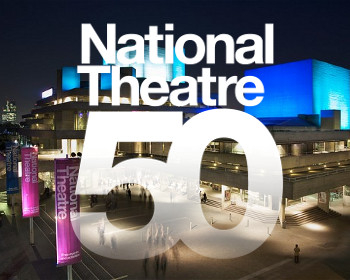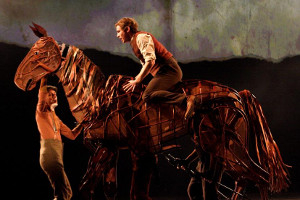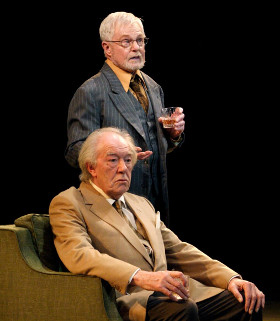Michael Coveney: National comes alive in memories at its own 50th birthday gala
A dream cast list and a canny selection of scenes sent our chief critic into raptures on Saturday night

One of my favourite moments at the National Theatre on Saturday night – there were many – was a mix-up in the Olivier stalls just behind me before the show even started. Howard Davies arrived to find Howard Davies sitting in his seat. The seated Davies was the NT board member and prominent economist. The standing, perplexed Davies was the NT associate director. They did not appear to know each other.
This minor blip ran counter to the overall mood of unanimity and mutual recognition: at the end, a phalanx of black-garbed stage management personnel marched to the front of the stage to the biggest cheer of the night, the applause led by Maggie Smith, Judi Dench, Michael Gambon, Simon Russell Beale, Alex Jennings, the whole cast of ninety-nine actors.
I know I shouldn't have been, but I was at first taken aback, and then overwhelmed, by this show of feeling and deep affection for the place and its unlovely concrete manifestation. At the amazing party in the Lyttelton foyers afterwards, well after midnight, I found myself in a remote corner with Maggie Smith, Bill Gaskill (her favourite director) and two brilliant stalwarts from the Olivier and Hall eras – David Ryall and James Hayes. I found it impossible to order my memories, or my thoughts, so, like everyone else, simply indulged in a burble of happiness and good will, with random shafts of salvaged production details.
In the course of the evening I also managed brief words with Christopher Hampton (having "a great time" on Stephen Ward, he said), Meera Syal, Matthew Marsh, Richard Eyre, Trevor Nunn, Jason Barnes (stage manager supreme), John Goodwin (Peter Hall's press officer, fixer and Boswell), Michael Blakemore, Richard Bean, publisher James Hogan, Michael Billington, Brenda Blethyn, Janine Duvitski (who told me you had to have appeared in fourteen NT shows to have been invited), lighting supremo Richard Pilbrow, Cottesloe architectural adviser Iain Mackintosh, Anthony O'Donnell, Stephen Daldry, Cameron Mackintosh… I felt as if my whole life in the National was flashing before me.
In his opening remarks, before the live broadcast began at 9pm, Nicholas Hytner name-checked his predecessors, drew applause for the 75 employees who had received 25-year service medals and even welcomed "the small band of critics and arts correspondents – who have sometimes been right" (meaning, not often). For one night only, he said, we were comrades.
Peter Hall, very ill now, was watching at home on television, but his son Edward was there, as were several members of the Olivier family led, of course, by Joan Plowright, who waved seigneurially from the stalls in dark glasses (her sight is very poor these days); her recording of a great speech of Saint Joan was made only a few days ago, and was a stunning contribution.

© Catherine Ashmore
Ironically, this Shavian Joan said she could do "without my war horse," even if the NT itself couldn't: War Horse has been the biggest money-spinner for the theatre since Amadeus, and Joey duly cantered to front of the stage in docile triumph later on.
I was sitting between Joan Plowright's carer and Benedict Nightingale, former critic of The Times, who reprised a few heavy sighs for old time's sake and encored his touching performance of not knowing who anyone was and what on earth the plays were. Everyone I've spoken to who saw the broadcast has said how amazing the extract from Peter Nichols's The National Health was. And there was Charles Kay, 44 years on, still lying in a hospital bed surrounded by flustered and over-worked medical staff.
Key NT playwrights loomed – Tom Stoppard, Michael Frayn (gosh, Roger Allam was absolutely riveting in a speech from Copenhagen), David Hare – but only Alan Bennett took to the stage himself, hilarious as Hector in the naughty French lesson scene from The History Boys, reunited not only with Clive Merrison as the headmaster and Stephen Campbell Moore as Irwin, but also James Corden, Jamie Parker, Sacha Dhawan and Dominic Cooper in his underpants. The other comedy highlight was Nicholas le Prevost and Penelope Wilton snuggling up in bed with pilchards on toast in Alan Ayckbourn's Bedroom Farce and channelling the original performances of Michael Gough and Joan Hickson.

© Catherine Ashmore
Huge applause,too, for Ian Charleson and Richard Griffiths on film – their great friend from RSC days in Stratford-upon-Avon, Hilton McRae, was accompanied by his wife, Lindsay Duncan, seen on film in a Cat on a Hot Tin Roof clip with Charleson – and ghosts abroad as Derek Jacobi and Michael Gambon breathed new life while summoning, respectively, Gielgud and Richardson in Harold Pinter's No Man's Land. Sheer magic.
Turbo-charged turns, there were, from Ralph Fiennes, sensational as a predatory, fearsome Lambert Le Roux in Hare and Brenton's Pravda; Judi Dench as Cleopatra and (though I never cared for her performance, or the production, of A Little Night Music) sending in Sondheim's clowns; Helen Mirren, with Tim Pigott-Smith, vengefully post-coital in Eugene O'Neill's Mourning Becomes Electra.
As a show, overall, the gala was simply breath-taking. The Olivier stage has never looked so good, or changed so smoothly, or been so effectively populated, the linking film and scene changes done to perfection, not a false note, nor any obvious omission.
Did you feel like seeing Jerry Springer – The Opera once again? Not really. London Road? Most definitely, how brilliant was that? And, all the time, the sense of continuity, passing it on (as Hector says in The History Boys), something else coming… I didn't find my taxi home till well into the small hours, but I'd already resolved to stay alive for the next 50 years.












